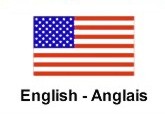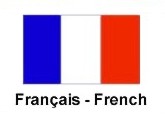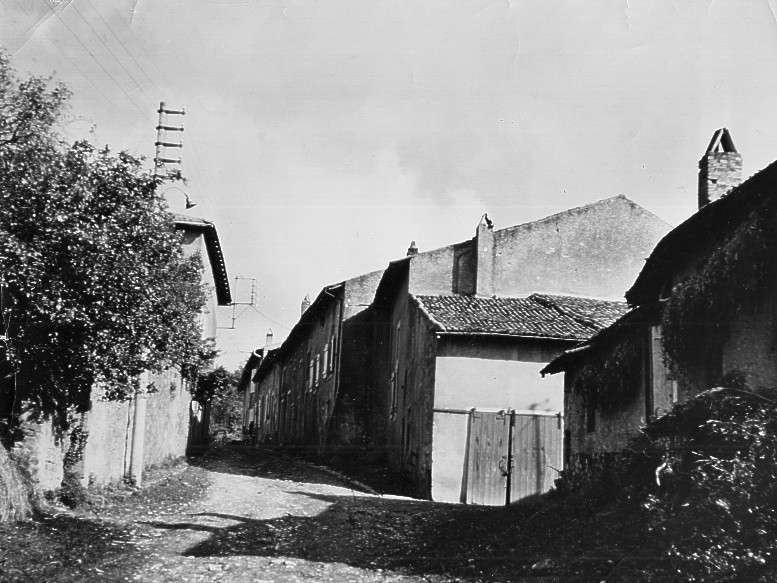This street in Feves looked like this when August Koelling of Morganville visited it last summer.
Morganville finds friendship an inspiration
Morganville - Five years after it started as a friendship program which later turned into a charity, the
Morganville friendship with Feves, France, is as strong as ever.
In fact, if the leaders of Morganville accurately reflect the feeling of the people, the program will continue
forever.
The battered town of Feves, with a population near the 300 of Morganville, has recovered from the World War II
ravages of the Nazis followed by Allied bombing and liberation by General Patton�s Third Army.
This is the report of five Morganville natives who have visited Feves since the program started in 1948. To date,
none of the stricken residents of Feves have visited this village in northern Clay County, but leaders hope [Henri]
Torlotting, the Feves schoolmaster, can be brought here before long.
In order to raise money for plane tickets for Torlotting and his wife, Morganville will have its annual Noel Party
December 30. Proceeds will go into a standing friendship fund. When that fund soars within a reasonable amount,
the Torlottings will be told of the pending trip.
So far, it remains a secret, according to Mrs. Velma Carson who co-ordinates Morganville aid to Feves.
Feves, located on the Moselle River near Metz in northern France, was hard hit in the war as first Germans
wrecked the town, then Allied bombers smashed it, and [finally] Patron's army came rushing thru.
It was because America contributed to the destruction and because Feves is a small agricultural community like
Morganville that the French town was adopted.
Morganville considered towns in Italy and Germany. After it decided to adopt a town thru Operation Democracy and
UNESCO in August, 1948. But the predominately Swedish-German community picked a French town as "something
different� from their background.
The whole idea of adopting a town came after Captain Charles Todd of Dunkirk, N. Y., appealed to his home town to
help Dunkerque, France, following World War II.
Todd, who organized and directs Operation Democracy, once visited Morganville to tell about their adopted town in
France. As an army officer helping to rehabilitate stricken cities, he visited Feves and learned how the people
there appreciated the aid from Morganville.
In the first few years, Morganville residents sent clothing, food, garden and flower seed, and other aid to Feves.
Now the town is back on its feet and aid this Christmas was reduced to a warm blanket to Mrs. Torlotting and candy
for the children. Also, on an individual basis, many persons in Morganville sent CARE packages to Feves.
Two years ago, the town sent $100 to Feves to buy a projector for the school. Morganville residents now take
colored slides and movies of their Kansas community and send them to France. In return, Feves sends back pictures
and persons visiting there bring back pictures and information on the adopted town.
An oil painting by Arvid Jacobson, a native of Morganville, who is now an art instructor at the University of
Kansas, was sent to Feves. In return, the people of Feves sent a wood carving of a typical French home scene to
Morganville.
From the beginning, the friendship was organized on an occupational basis. "The world is not so much divided by
countries as by trades; Mrs. Carson says. "Art and music have always been international and now we are showing that
other professions are also international."
So the mayor of Morganville, Dan Roenigk, writes the mayor of Feves, August [Berne]. Housewives write to
housewives, and school children to school children.
Henri Torlotting, schoolmaster at Feves, may get a chance to visit Morganville soon if plans work out. He is
pictured with his wife and nephew, Gerard. He calls the friendship between the two towns "a lesson of charity
and goodness."
There is a tremendous language barrier as no one in Morganville can read or speak French, and no one in Feves can
read or speak English. Each letter must be translated, a requirement which slows down communications considerably.
But the letters do come thru and get translated. In March, 1949, schoolmaster Torlotting wrote to Mayor Roenigk,
" . . . You cannot ignore that the friendship has made a great stir in our region. The press, superior authorities,
everyone has praised Morganville. I wish to . . . in all simplicity from the bottom of my heart to thank you (for
seeds) and also for the great lesson of charity and goodness. You were the first in our region to adopt a town and
already other American towns are following your example."
Another letter received by Mrs. Ed Menard and Mrs. Norman Canfield from the priest in Feves stated, "On receipt of
your packages of candy, we sounded the horn and on Christmas I organized a party. The joy was immense while St.
Nicholas distributed the candy. I made some pictures which are being sent to you. The package of clothes and
skimmed milk have arrived. Yesterday, a delegate of the UNESCO brought me a package of toys, unluckily broken.
"The distribution of clothes is almost complete. The powdered milk was distributed regularly all the 15 days and
there is yet enough for two months. I wish to thank you to transmit my thanks for the people of Feves to our
friends of Morganville."
Feves is a Catholic community and put much work in rehabilitation of their 16th Century Church in the center of
town. The people there wrote of the church's rehabilitation with great pride.
So stimulating was the idea that Morganville is now rehabilitating their church. The Protestant community has
completely redecorated their church inside, and plans are now being made to rebuild the outside in keeping with the
church rebuilding of Feves.
"All of us have learned a lot thru the friendship program and it has brought a great liberalizing of attitudes
here," Mrs. Carson says. "The people have banded together to study French from records, altho the project mainly
failed. However, we are still looking forward to learning the language some day." English lessons have been sent
to Torlotting in hopes that he will learn the language before he makes his trip to Morganville.
The first money to aid Feves was raised thru a pageant written by Mrs. Carson in 1948. The pageant showed how the
people of France live and the background of Morganville, including the native Indians of Kansas. George Johnson,
a high school student in 1948, played the part of an Indian in the pageant. He is now in the occupation army in
Germany and is one of the five persons from Morganville who have visited Feves.
August W. Koelling, retired Morganville farmer, has visited Feves twice, once this fall and once two years ago.
He will be one of the main attractions at the Noel party December 30, when he will show his colored movies of Feves
and tell people how the town is faring.
Other Morganville residents who have visited Feves, Mr. and Mrs. Edwin Utley and Anna M. Roenigk, sister of the
mayor, will recall their experiences for the people. At the first pageant and party, more than 3,000 persons
attended and gave $1,000 for the program. Many of them were outsiders, some coming from as far as New York.
"One of the big reasons why the program has been such a success is because of the personal contacts made when
people from Morganville visited Feves," Mayor Roenigk says. Another is because Mrs. Carson has many friends in
New York who helped expedite exchanges of information and packages. Mrs. Carson for many years was a newspaper
reporter, free lance writer, and advertising executive in New York and has been invaluable in obtaining the
assistance of larger firms there to help in the program, Roenigk said.
The affiliation of the two towns has brought much attention to each as magazines have written the story of the
program and various radio networks have told the story of "the tiny town in Kansas doing one constructive thing
for peace."
In Feves, Torlotting says "We have basked in the limelight, with officials stalking the streets, looking and
wondering why we were chosen for friendship by some strange city across the sea."
The Feves Committee, in a letter to the Morganville committee for Feves, said in 1949, "Now Morganville and
Kansas are no longer a country unknown to us and we are able to picture for ourselves this village in the middle
of the vast plains between two oceans.
"We have a better idea of this beautiful community that you have made in spite of diversity of races and
nationalities thru your love of work, your love of music, and your church, symbol of the charity that has united
all the children of God, who is over all.
"You will remind us that if the war had not caused the destruction of our village, certain of your sons would
have returned. We will not forget, better yet we will think of them in our prayers."
By Lyle Schwilling
The Daily Capital



